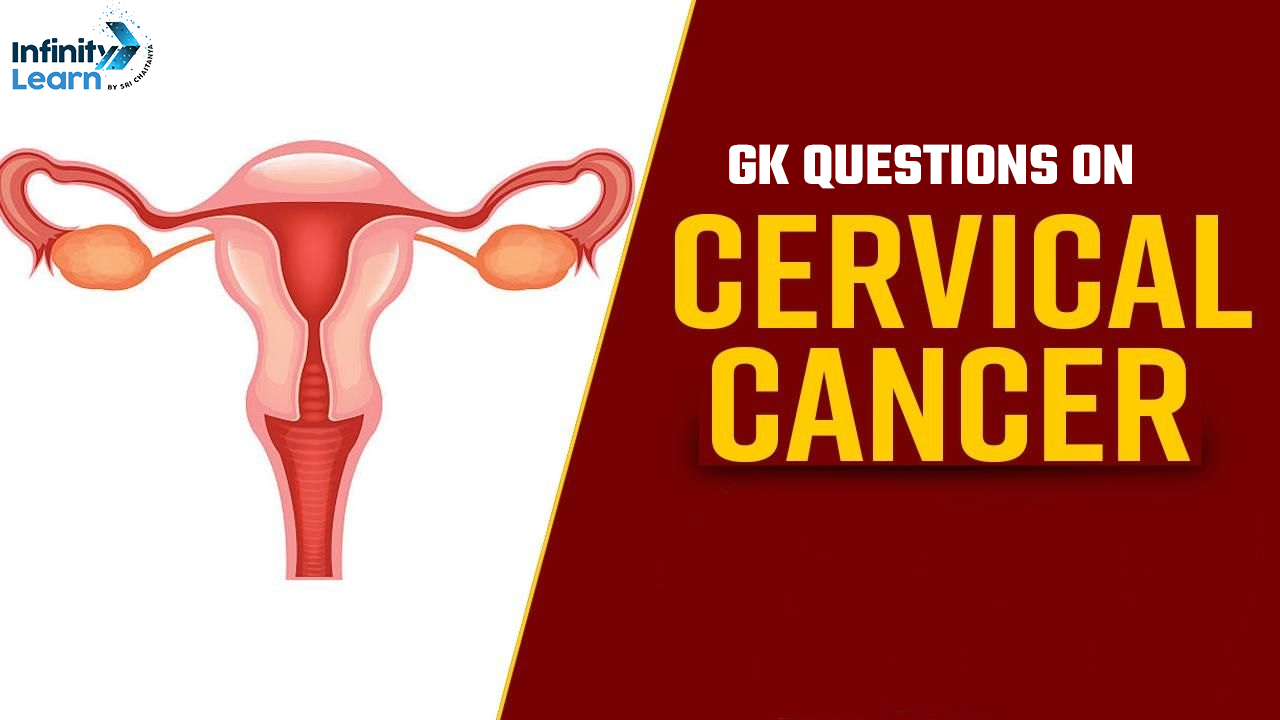Table of Contents
Cervical cancer is a significant health issue that affects many women worldwide. Understanding this disease is crucial for early detection and prevention. The following general knowledge questions cover important facts about cervical cancer, its causes, diagnosis, and treatment options. They are designed to increase awareness and provide essential information in a simple and straightforward manner. Whether you are a student, educator, or just someone looking to expand your knowledge, these gk questions can help you learn more about cervical cancer and its impact.
50 GK Questions on Cervical Cancer

Q. What virus is most commonly associated with cervical cancer?
Ans. HPV
Q. What is the primary screening test for cervical cancer?
Ans. Pap smear
Q. Which vaccine can prevent cervical cancer?
Ans. Gardasil
At what age is cervical cancer screening generally recommended to start?
Ans. 21
Q. What type of cells does cervical cancer typically affect?
Ans. Epithelial
Q. Which body part is primarily affected by cervical cancer?
Ans. Cervix
Q. Is cervical cancer more common in younger or older women?
Ans. Older
Q. Can regular screening reduce the risk of cervical cancer?
Ans. Yes
Q. What is the advanced diagnostic test for cervical cancer besides Pap smear?
Ans. Colposcopy
Q. Which gene mutations are often linked to a higher risk of cervical cancer?
Ans. BRCA1/2
Q. What is a precancerous condition of the cervix called?
Ans. Dysplasia
Q. What is the term for the spread of cancer from the cervix to other body parts?
Ans. Metastasis
Q. Which procedure can diagnose and treat early-stage cervical lesions?
Ans. LEEP
Q. Can cervical cancer be asymptomatic in early stages?
Ans. Yes
Q. What symptom is most commonly associated with advanced cervical cancer?
Ans. Bleeding
Q. What is the term for the abnormal growth of precancerous cells on the cervix?
Ans. CIN
Q. What lifestyle factor is considered a risk for cervical cancer?
Ans. Smoking
Q. Which sexually transmitted infection is a major risk factor for cervical cancer?
Ans. HPV
Q. Can long-term use of oral contraceptives increase the risk of cervical cancer?
Ans. Yes
Q. What is the most common histological subtype of cervical cancer?
Ans. Squamous
Q. What is the less common subtype of cervical cancer, compared to squamous cell carcinoma?
Ans. Adenocarcinoma
Q. What is the term for the removal of the cervix as a treatment for cervical cancer?
Ans. Trachelectomy
Q. What kind of therapy uses high-energy beams to kill cancer cells in cervical cancer?
Ans. Radiation
Q. What is the term for the surgical procedure that removes the uterus and cervix?
Ans. Hysterectomy
Q. Can high-risk human papillomavirus types cause cervical cancer?
Ans. Yes
Q. What stage of cervical cancer indicates that cancer has spread outside the cervix?
Ans. Stage IV
Q. Which imaging test is often used to check for the spread of cervical cancer?
Ans. MRI
Q. What part of the immune system does HPV target to persist and potentially cause cervical cancer?
Ans. T-cells
Q. What is the term for the treatment that uses drugs to kill cancer cells systemically?
Ans. Chemotherapy
Q. Can regular HPV vaccinations significantly reduce the risk of cervical cancer?
Ans. Yes
Q. What is the term for the transformation zone where cervical cancer commonly begins?
Ans. T-zone
Q. What symptom, besides bleeding, can indicate advanced cervical cancer?
Ans. Pain
Q. Which nutrient deficiency is linked to a higher risk of cervical cancer?
Ans. Folate
Q. Can cervical cancer affect fertility?
Ans. Yes
Q. What is the test that detects the presence of high-risk HPV strains?
Ans. HPV test
Q. What is the major public health strategy to prevent cervical cancer globally?
Ans. Vaccination
Q. What is the term for the thin layer of tissue that covers the cervix?
Ans. Epithelium
Q. What is the term for the spread of cervical cancer to the lymph nodes?
Ans. Lymphatic
Q. Can cervical cancer be hereditary?
Ans. Rarely
Q. What procedure is used to view the cervix and take tissue samples?
Ans. Biopsy
Q. What is a common side effect of radiation therapy for cervical cancer?
Ans. Fatigue
Q. What is the term for the benign condition that can mimic cervical cancer symptoms?
Ans. Polyp
Q. What is the term for the glandular cells inside the opening of the cervix?
Ans. Endocervical
Q. Can cervical cancer recur after treatment?
Ans. Yes
Q. What lifestyle change can reduce the risk of developing cervical cancer?
Ans. Quitting smoking
Q. What is the 5-year survival rate for early-stage cervical cancer?
Ans. High
Q. What is the term for the co-testing of HPV and Pap smear?
Ans. Cotesting
Q. What is a surgical procedure that removes only the cancerous tissue in the cervix?
Ans. Conization
Q. What is the term for the abnormal appearance of cells under a microscope?
Ans. Dyskaryosis
Q. What organization provides guidelines for cervical cancer screening?
Ans. ACS
FAQs on Cervical Cancer
What is cervical cancer?
A type of cancer that occurs in the cells of the cervix.
Can cervical cancer be cured?
A hysterectomy can often cure the cancer and stop it from coming back.
How serious is cervical cancer?
When cervical cancer is diagnosed at an early stage, the 5-year relative survival rate is 91%.
What are my first signs of cervical cancer?
The first sign of cervical cancer is vaginal bleeding after sex.
Is cervical cancer painful?
Any discomfort associated with an early-stage tumor may be mild or even unnoticeable.




